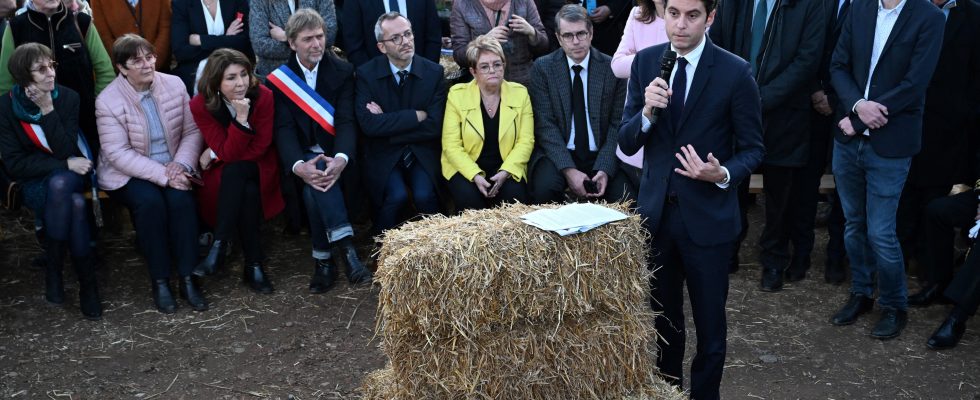“A new chapter for French agriculture”; “putting agriculture above all else”. It is with these words that Gabriel Attal introduced his announcements for the agricultural world, whose representatives have been mobilized across the country for almost a week to show their anger over their working conditions and their income.
Traveling to the town of Montastruc, in Haute-Garonne, the Prime Minister unveiled, Friday January 26, several measures to counter the risk of a worsening of the crisis. The FNSEA, the majority agricultural union, must react to these announcements in the evening. End of the increase in the tax on GNR, 10 “immediate simplification” measures, “three very heavy sanctions” against companies not respecting the EGAlim law… Here are the main announcements from Gabriel Attal.
Removal of the tax increase on GNR
In response to the anger of farmers, who denounced in particular the gradual increase (until 2030) of the tax on non-road diesel (GNR), Gabriel Attal announced that he was removing this increase.
“We are going to stop with this trajectory of increase in GNR”, announced the head of government, thus acceding to one of the main demands of farmers. To “simplify” procedures, he also announced that tax rebates on this fuel would be deducted upon purchase, and no longer after the fact on receipt, and this “by the summer”.
Ten “immediate simplification” measures
Gabriel Attal announced “ten immediate simplification measures” for farmers, which he wants to be a prelude to a broader movement to “drastically simplify our procedures” and “standards”.
Referring to a “month of simplification” between now and the Agricultural Show – which opens at the end of February in Paris – the head of government notably cited the “cleaning” of agricultural waterways or the reduction of deadlines appeal against agricultural projects. Gabriel Attal also announced the implementation of a “presumption of urgency” in the event of an appeal, so that a project can be completed in “ten months maximum”. The example of “hedges”, governed by around ten standards, was also cited by the Prime Minister, who wants there to be only one regulation in this area.
“Very heavy” sanctions against companies not respecting EGAlim laws
Gabriel Attal also announced that the government was going to impose “very heavy” sanctions against three companies not respecting the EGAlim laws, which aim to protect the income of farmers in the context of negotiations with manufacturers and supermarkets.
“The objective is clear: to enforce EGAlim everywhere, without exception,” declared the Prime Minister, who also announced the strengthening of controls and promised to put “maximum pressure” on the ongoing negotiations between players in the sector.
France still “opposes” the agreement between the EU and Mercosur
“France is very clearly opposed” to “the signing” of the controversial trade agreement between the European Union and the Latin American countries of Mercosur, assured Gabriel Attal: “I repeat it here very clearly , very clear. The President of the Republic has always opposed it and we continue and will continue to oppose it,” he declared from Haute-Garonne.
Mercosur and the EU have been negotiating this agreement for years, which stumbles on environmental issues. It is particularly denounced by French farmers, who are worried about a risk of unfair competition from South American producers.
Increase in emergency aid for cattle diseases
The Prime Minister also affirmed that compensation for farms most in difficulty facing epizootic hemorrhagic disease, a new pathology which weakens cows, would be increased.
He mentioned a “budget of 50 million euros” and announced an “increase in the compensation rate to 90%” for breeders affected by this disease which appeared in September on farms in the south-west. The government set compensation last week at 80% of the value of dead cows and veterinary costs.
